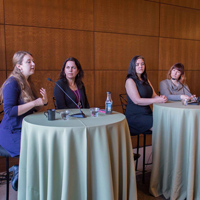Conference on Human Trafficking
March 21, 2016

ST. LOUIS — Human trafficking isn’t just an issue that happens in some remote country, rather it’s a problem that is happening in our own backyards. That was one of the primary lessons shared during the Human Trafficking Panel and Workshop Program held in the East Academic Building March 19.
About 60 people attended the morning event. The event was co-sponsored by Webster University, The Archway Chapter of The Links Incorporated, and Made For Freedom. Webster’s director of Ceremonies and Events Nancy Higgins and associate professor of Legal Studies Robin Jefferson Higgins organized the event.
“Most victims of human trafficking don’t self-identify as victims,” Amanda Mohl, with the International Institute, said during the opening session. “It’s about exploitation, and most people don’t want to admit they are being exploited.”
According to the FBI, St. Louis ranks among the top 20 cities in the United States for human trafficking, said Susan Buford, President of the Archway Chapter of the Links. Michael Henderson, the chief executive officers of the Phoenix Risk Assessment and a security expert, said many of the local victims are likely people who are working as prostitutes or in strip clubs. He said local victims also are day laborers who were brought to the United States on the promise of getting a good job, but instead were then saddled with huge debts to the people who smuggled them into the country and are forced to work long hours at low pay until the debts are paid.
Professor Anne Geraghty-Rathert discussed the WILLOW (Women Initiate Legal Lifelines to Other Women) Project. One of its first cases involves a young woman named Angel who was coerced into the sex trade. Angel’s captors kidnapped her, another young woman and a young child, and then brutally murdered two elderly women. Angel was convicted alongside her captors for the murders, despite her low level mental functioning. She currently is serving a life sentence in prison because the legal system did not recognize her as a human trafficking victim, but rather said she was a willing participant, Geraghty-Rathert said.
The panel also discussed a trip to Leiden by Webster University students and professors. Mary Claire Jost, a student in Webster’s legal studies program, said the group visited the “Red Light” district in Amsterdam and learned that many of the women who perform in the clubs are from Africa and Eastern Europe. Most were likely coerced into the sex-trade business on the promise of a better life.
After the opening panel, the group held three workshops: “The Look of Human Trafficking,” “Victims and Healing” and “Living the Leiden Experience.”
